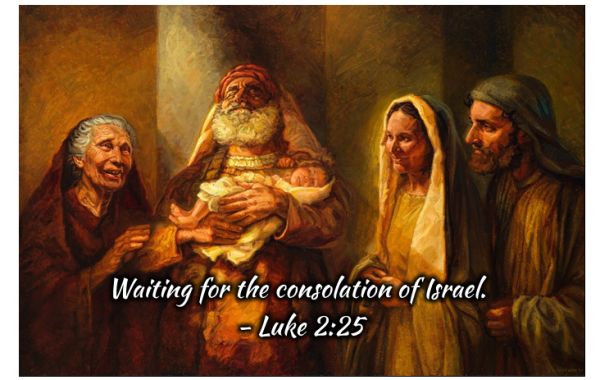Luke 2:25 there was a man in Jerusalem, whose name was Simeon; and the same man was just and devout, waiting for the consolation of Israel: and the Holy Ghost was upon him. 36-38 there was one Anna, a prophetess, the daughter of Phanuel, of the tribe of Aser: she was of a great age, ...And she was a widow of about fourscore and four years, which departed not from the temple, but served God with fastings and prayers night and day. And she coming in that instant gave thanks likewise unto the Lord, and spake of him to all them that looked for redemption in Jerusalem.
Simeon’s Character
The Bible says of Simeon, Luke 2:25-27 And, behold, there was a man in Jerusalem, whose name was Simeon; and the same man was just and devout, waiting for the consolation of Israel: and the Holy Ghost was upon him. 26 And it was revealed unto him by the Holy Ghost, that he should not see death, before he had seen the Lord's Christ. 27 And he came by the Spirit into the temple: and when the parents brought in the child Jesus, to do for him after the custom of the law,
He was just, this describes his relationship and attitude toward others. He was devout, this described his relationship and attitude toward God. He was led by the Holy Spirit, this describes his attitude toward following and obeying God.
The Bible says that Simeon was told by the Spirit that he would not die until he saw, “the consolation of Israel.” This must have become a lifelong mission, a divine quest to spend his life looking for the consolation of Israel.
So just and devout was Simeon that on this day the Holy Spirit got his attention and led him into the Temple. We don’t exactly how this was done, just that God directed him to the right place at the right time because he was the right man.
Now in vss. 28–32 we find Simeon’s response to the fulfillment of his life’s mission. He praises, he prays, and he prophesies while he holds this little month-old child in his arms.
Simeon’s words give us the fifth song that Luke records in these opening chapters, Luke 2:28-32 Then took he him up in his arms, and blessed God, and said, 29 Lord, now lettest thou thy servant depart in peace, according to thy word: 30 For mine eyes have seen thy salvation, 31 Which thou hast prepared before the face of all people; 32 A light to lighten the Gentiles, and the glory of thy people Israel.
It is a song of thanksgiving for God’s faithfulness, “Lord let your servant depart in peace, for my eyes have seen they salvation.” He blesses God for keeping His promise and sending the Messiah. He joyfully praises God that he has been privileged to see the Lord’s salvation in the face of this child.
It is a song of fulfillment and contentment. Now he is content to die, ready to go home, knowing that he has seen the One who will save Isael.
It is also a song of salvation for all. “You have prepared salvation for all the people. Then he expands that by saying, “A light to lighten the Gentiles and the glory of thy people Israel.”
It is also a song of prophecy Luke 2:34-35 Simeon blessed them, and said unto Mary his mother, Behold, this child is set for the fall and rising again of many in Israel; and for a sign which shall be spoken against; 35 (Yea, a sword shall pierce through thy own soul also,) that the thoughts of many hearts may be revealed.
Simeon stopped praising and started prophesying, and in his message, he used three images: a stone, a sign, and a sword.
Jesus would be the stone upon which many would stumble and fall in judgement and others would fall in repentance but rise in salvation.
The Messiah child that Simeon held would also be a sign, The world means “a miracle,” not a miracle of power but a miracle of revelation, of God’s truth. Just as the angel told the shepherds about the sign they would recognize the newborn, Jesus himself is the sign by which we can recognize the love of God.
Simeon also said that the Messiah would be a sword. This sword would be a two-edged. One edge would pierce the heart of Mary with terrible sorrow and the other edge would sever all earth’s relationships and reshape them according to heaven’s relationships.
Matthew 10:34-39 Think not that I am come to send peace on earth: I came not to send peace, but a sword. For I am come to set a man at variance against his father, and the daughter against her mother, and the daughter in law against her mother in law. And a man's foes shall be they of his own household. He that loveth father or mother more than me is not worthy of me: and he that loveth son or daughter more than me is not worthy of me. And he that taketh not his cross, and followeth after me, is not worthy of me. He that findeth his life shall lose it: and he that loseth his life for my sake shall find it.
Jesus would be the sword that severs all other relationships and breaks all previous bonds. His coming is the dividing line of history, of families, and of eternity.
Simeon was there that day and led by the Holy Spirit he saw it. And he was not alone, as he praised God, someone came close, listened and then added her praise to his.
Anna’s Character – Luke 2:36-38
Now we come to Anna’s part in this story. Her name means “grace.” She was an aged widow. She was also a prophetess. This doesn’t me she told the future but that she was one who spoke of God’s words.
She departed not, literally this means, she kept on not leaving. She kept on keeping on in the Lord’s House. The House of God was her anchor, her landmark, her calling. She had to be there.
She served God with prayers and fasting night and day. This doesn’t mean that she lived on the Temple grounds but that anytime there were times of worship, times of prayer and fasting, she was there. She never missed a service in the temple. She never missed an opportunity to serve the Lord by being in the House of God. By simply being there she honored her God.
Her faithfulness to the Lord’s House made her stand out from all others and God rewarded that faithfulness on this day. Wouldn’t it have been a shame to miss going to
The Lord’s House on the day the Messiah came through the gates. But Anna never missed a service.
Luke in vs. 38 says Anna “coming in that instant gave thanks likewise unto the Lord.” Just as Simeon finished his praise, she jumps in. We aren’t told the exact words, only she “gave thanks likewise unto the Lord.” But we do see something that we didn’t see before.
She gives thanks and then she goes a step further “she spake of him to all them that looked for redemption in Jerusalem.” We get the impression that Simeon and Anna weren’t the only ones who went to the Temple and looked at the parents as they brought in their sons. It seems there were others who had patiently and faithfully waited for God’s promises to be proven true. Anna made sure that others knew, she had found Christ in the Temple that day.
She, Simeon and the other faithful ones saw so much, endured so much, suffered so much but above all these they hoped for much more. And that hope was fulfilled that day. The greatest thing that ever could happen, happened when the Messiah came. They experienced the climax of life, they saw the summit of history. Everything else was secondary, unimportant now because they had found the consolation of Israel, and the redemption of Jerusalem.
Cerca
Post popolari







